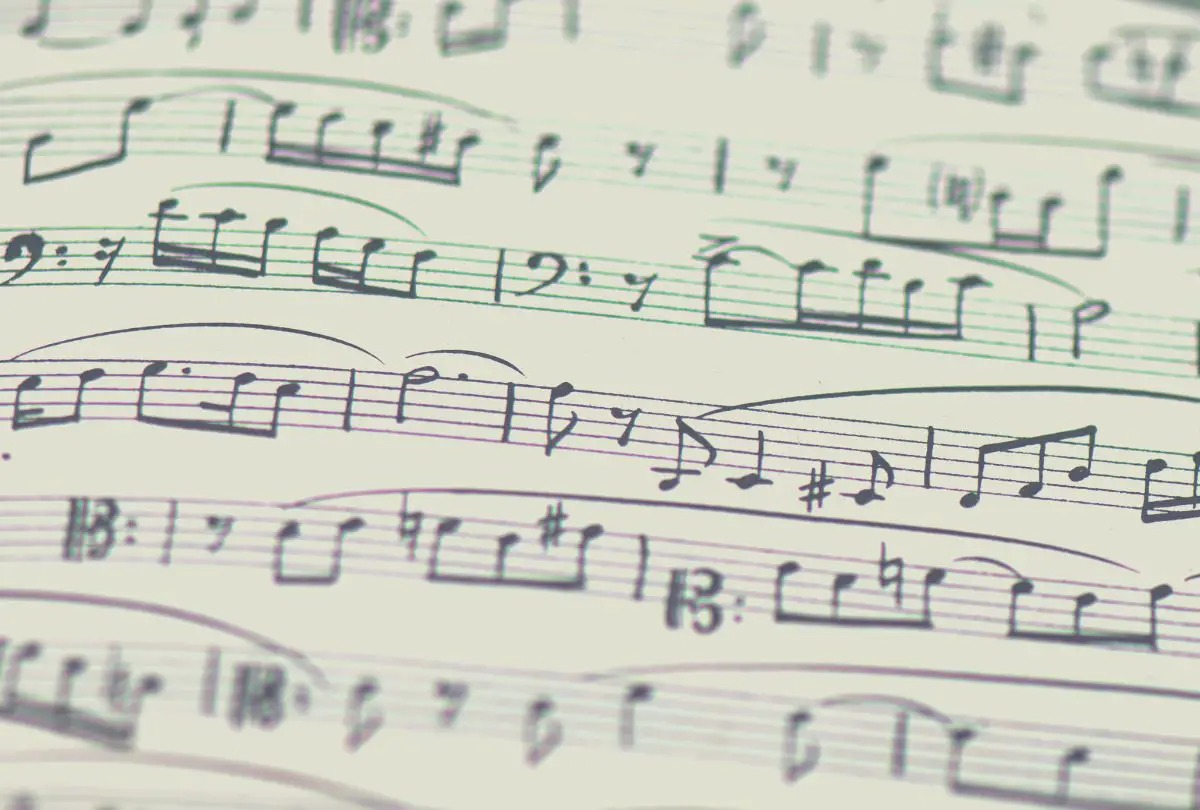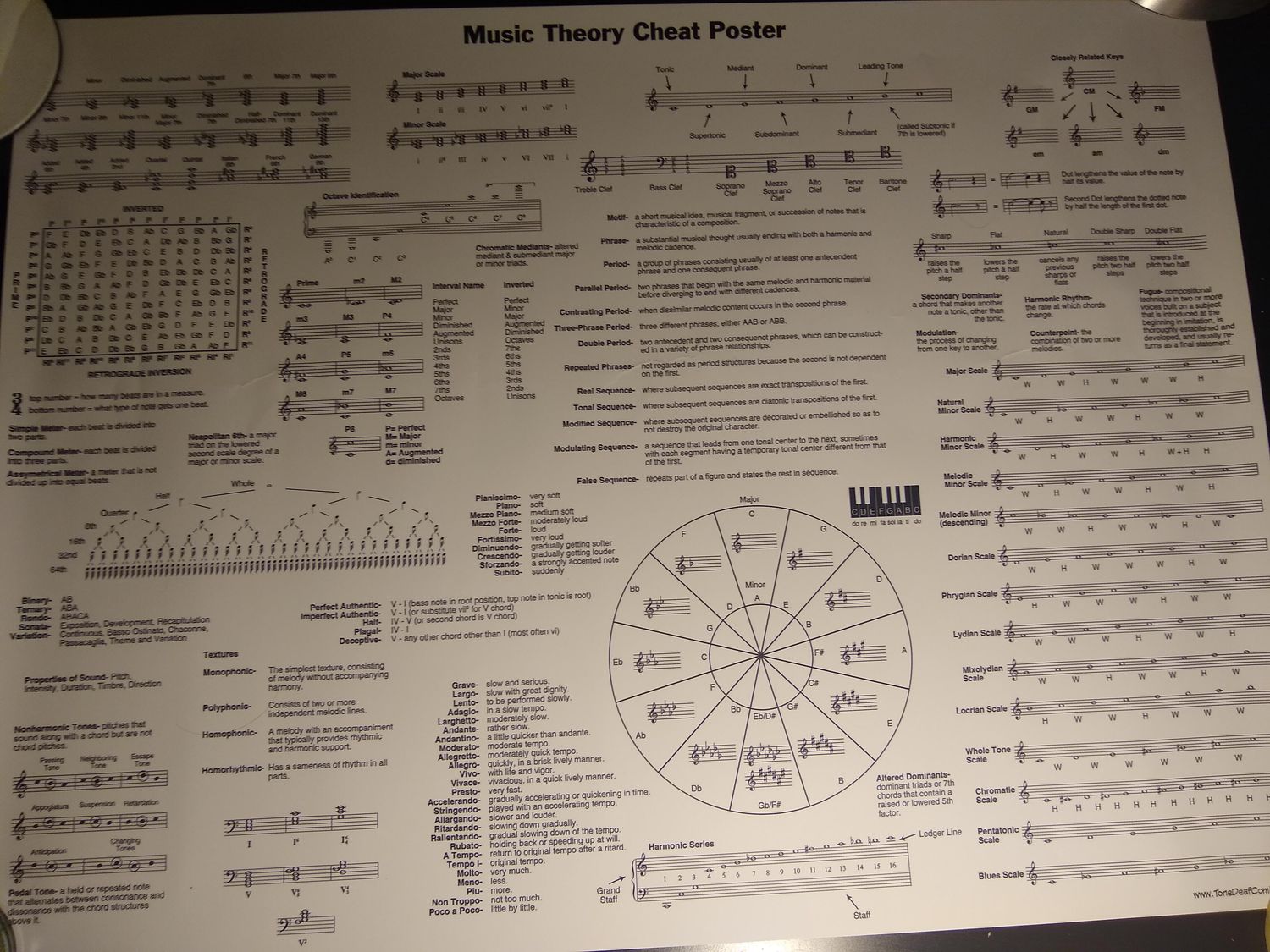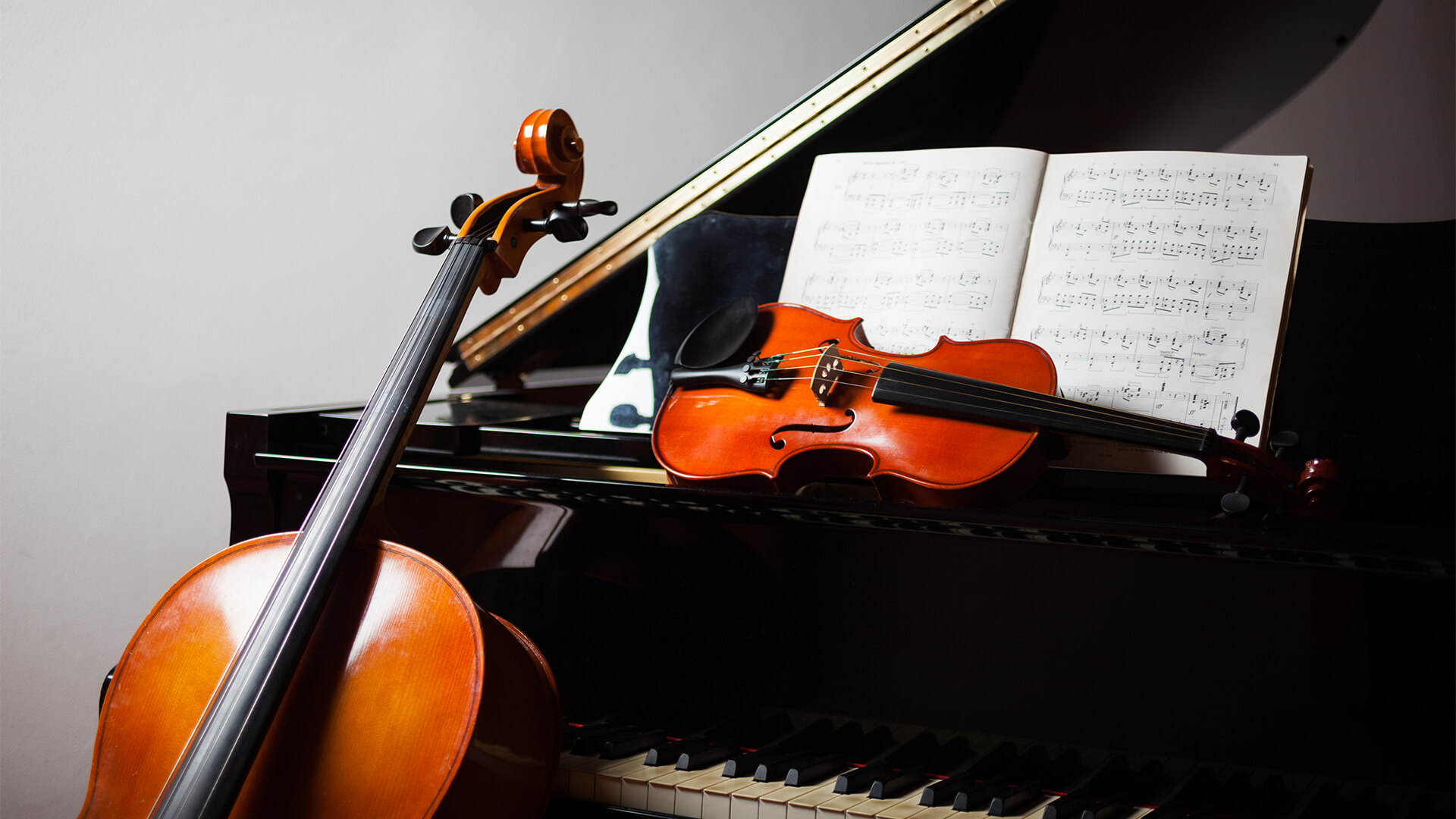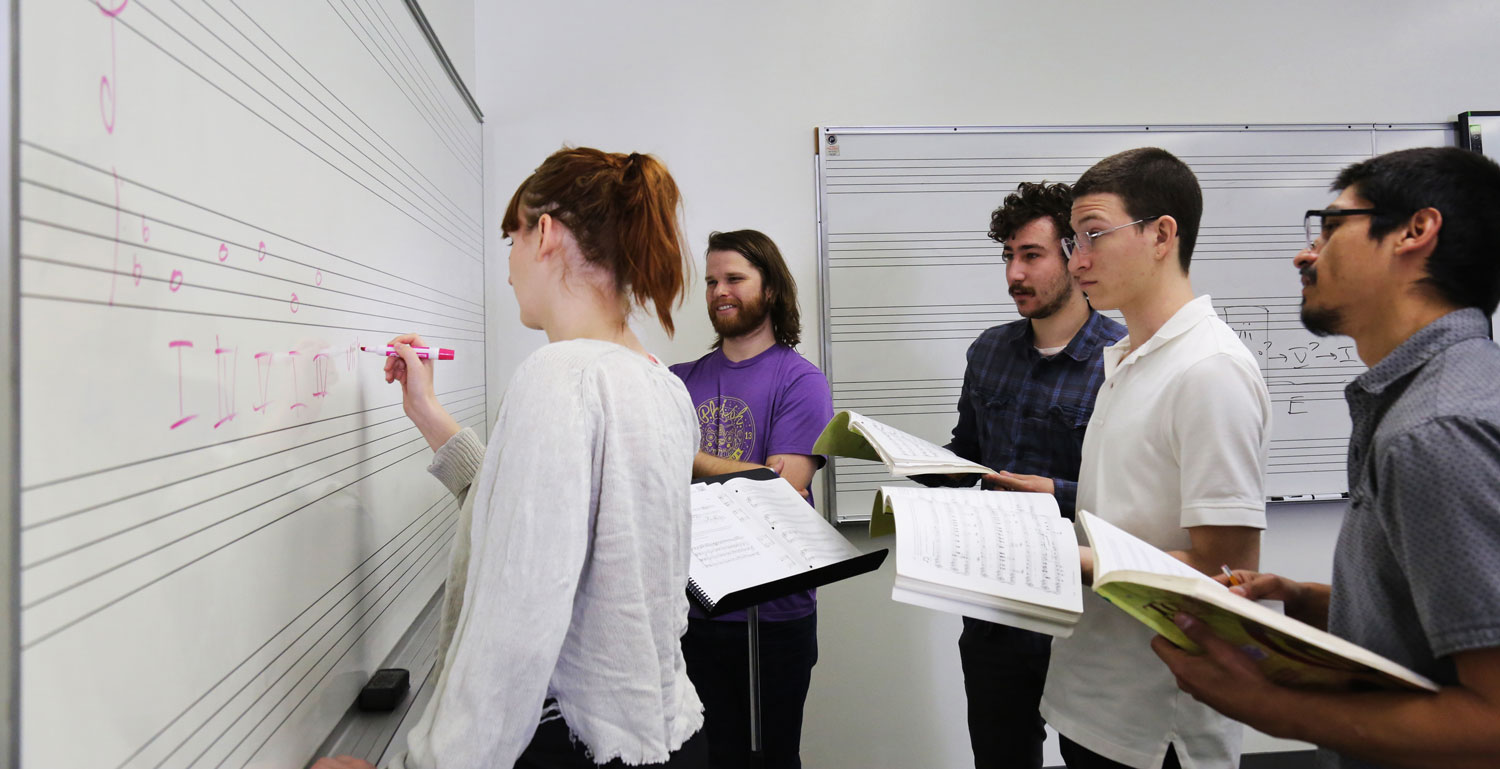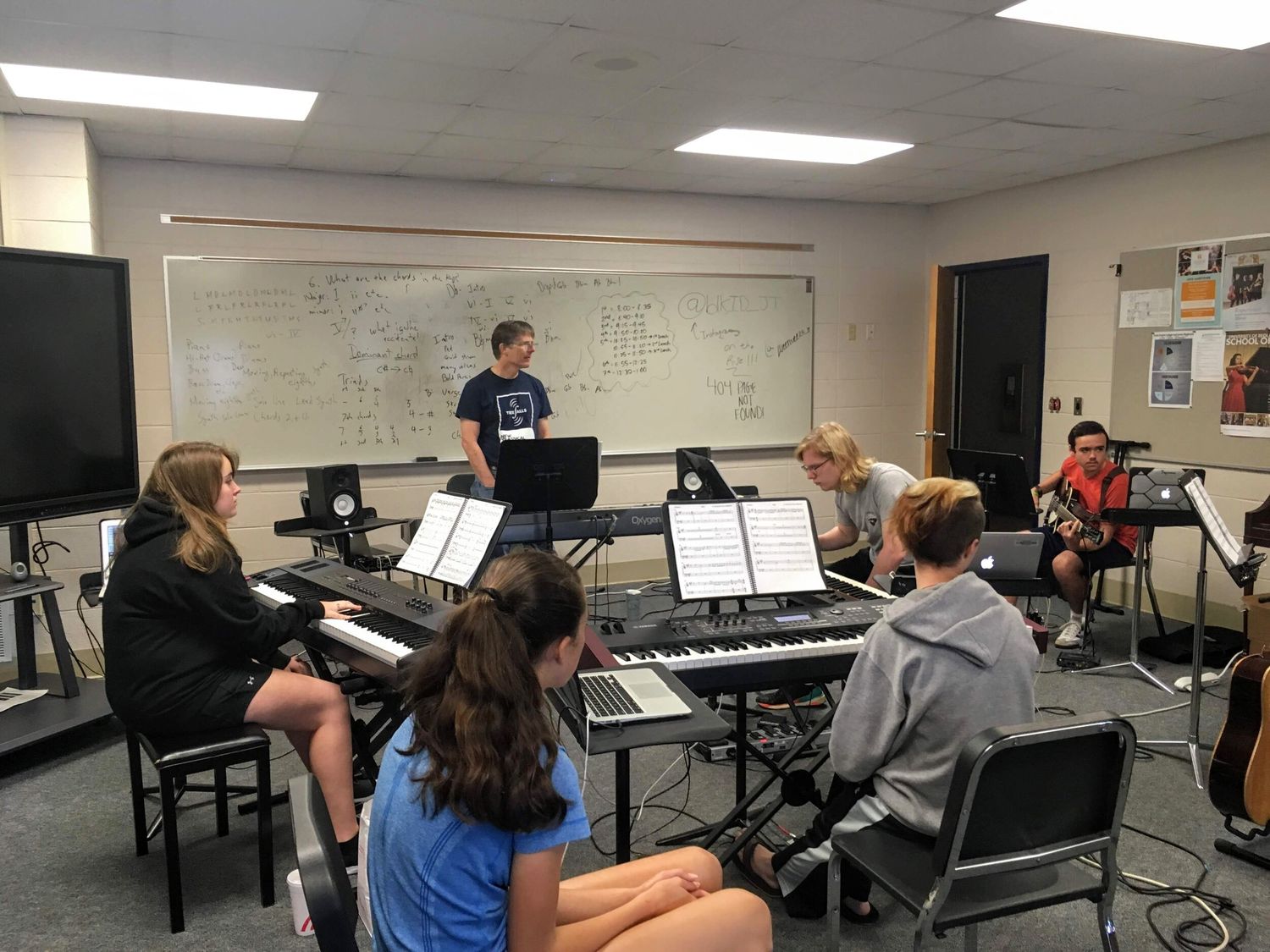Home>Production & Technology>Music Theory>Where To Learn Music Theory


Music Theory
Where To Learn Music Theory
Published: February 1, 2024
Discover the best places to learn music theory and enhance your musical knowledge. Explore comprehensive resources and courses on Music Theory for beginners and experienced musicians.
(Many of the links in this article redirect to a specific reviewed product. Your purchase of these products through affiliate links helps to generate commission for AudioLover.com, at no extra cost. Learn more)
Table of Contents
Introduction
Music Theory is the foundation of understanding and creating music. Whether you’re an aspiring musician, a music producer, or simply a music enthusiast looking to deepen your appreciation for the art form, learning music theory can unlock a deeper understanding of how music works.
From understanding harmony and chord progressions to dissecting melody and rhythm, music theory provides the tools to analyze and appreciate the elements that make up a musical composition. It acts as a language that enables musicians to communicate and collaborate effectively.
While music theory can seem intimidating at first, there are numerous resources available to help you learn and master this discipline. Whether you prefer online courses, books, or in-person lessons, there are options for every learning style and level of expertise.
In this article, we will explore various avenues where you can learn music theory. From online courses and YouTube channels to local music schools and private teachers, we will provide you with a comprehensive guide on where to learn music theory. So, let’s dive in and discover the best avenues for expanding your knowledge of music theory.
Online Music Theory Courses
Online music theory courses have gained tremendous popularity in recent years, offering convenience and flexibility to learners of all levels. These courses are designed to provide comprehensive and structured learning experiences, allowing you to study at your own pace and from the comfort of your own home.
One popular platform for online music theory courses is Coursera. Coursera offers a wide range of music theory courses from renowned institutions and instructors around the world. These courses cover various topics such as music notation, harmony, and composition. Many of them also include interactive exercises, quizzes, and assignments to enhance your understanding and application of the concepts.
Another prominent online learning platform is Udemy. Udemy offers a vast selection of music theory courses created by experts in the field. These courses cater to different skill levels, from beginner to advanced, and often provide downloadable resources and supplementary materials to support your learning.
If you prefer a more structured and immersive learning experience, you might consider platforms like Classical Music Theory or Musictheory.net. These platforms offer comprehensive music theory courses with video lessons, interactive exercises, and quizzes to test your knowledge.
It’s important to note that some online music theory courses may require a fee, while others offer free access to their basic content with the option to upgrade for additional features and resources. Take advantage of the free trials, course previews, and reviews to find the course that best fits your needs and learning style.
Online music theory courses offer a flexible and accessible way to learn music theory at your own pace. Whether you’re a beginner starting from scratch or an experienced musician looking to deepen your understanding, these courses provide a structured curriculum and expert guidance to help you achieve your musical goals.
YouTube Channels for Music Theory
YouTube has rapidly become a valuable resource for learning music theory, offering a vast array of educational content from experienced musicians and music educators. These YouTube channels provide engaging and accessible lessons that cater to various skill levels and musical interests.
One highly recommended channel for learning music theory is Michael New. Michael New is a music theory and composition teacher who provides clear and concise explanations of various music theory concepts. His videos cover topics such as scales, chords, and rhythmic patterns, making it easier for beginners to grasp the fundamentals.
For those interested in jazz and improvisation, Jazz Tutorial is a fantastic channel. The channel creator, Brendan Lowe, breaks down complex jazz theory into manageable lessons, covering topics like chord progressions, soloing techniques, and jazz harmony. His friendly teaching style and real-life examples make learning jazz theory enjoyable and accessible.
If you’re looking for a channel that dives deep into music analysis and composition, check out 8-bit Music Theory. This channel is run by Warren Lain, who analyzes video game music and popular compositions through the lens of music theory. His videos offer a unique perspective on harmony, melody, and rhythm, making it an excellent resource for those interested in composition techniques.
Another popular channel is Rick Beato. Rick Beato is a musician, producer, and educator who covers a wide range of music-related topics, including music theory. His channel features in-depth music theory lessons, as well as discussions on various musical genres, historical analysis of iconic songs, and improvisation techniques.
Whether you are a visual learner or simply prefer to learn at your own pace, YouTube channels for music theory offer a wealth of free educational content. Take advantage of these channels to deepen your understanding of music theory, expand your musical vocabulary, and improve your overall musicianship.
Music Theory Books and Publications
Books have long been a staple for learning music theory, providing a comprehensive and in-depth exploration of the subject. There are countless books available that cover a wide range of music theory topics, from basic principles to advanced concepts.
One highly recommended book for beginners is “The Complete Idiot’s Guide to Music Theory” by Michael Miller. This book offers a user-friendly approach to learning music theory, covering essential topics such as notation, rhythm, scales, and chords. It includes practical examples and exercises to reinforce your understanding of the material.
For those seeking a more in-depth exploration of music theory, “Tonal Harmony” by Stefan Kostka and Dorothy Payne is a widely used textbook in music schools and universities. This book delves into advanced concepts like harmonic progression, voice leading, and form analysis. It provides a comprehensive understanding of Western classical music theory and its practical applications.
If you are interested in jazz theory, “The Jazz Theory Book” by Mark Levine is a highly regarded reference. This book covers jazz harmony, improvisation techniques, and chord-scale relationships. It is a valuable resource for jazz musicians and anyone looking to explore the complexities of jazz theory.
In addition to books, there are also music theory publications that offer a wealth of articles, analysis, and scholarly research. One notable publication is the “Journal of Music Theory,” which presents cutting-edge research and analysis in the field of music theory. This journal offers valuable insights into the latest developments and advancements in music theory.
When choosing music theory books or publications, consider your level of expertise and the specific topics you wish to delve into. Look for books that provide clear explanations, practical examples, and exercises to reinforce your learning. Don’t hesitate to explore different authors and publications to find the ones that resonate with your learning style and musical interests.
Local Music Schools and Academies
If you prefer a more traditional approach to learning music theory, attending a local music school or academy can provide you with a structured and immersive learning experience. These institutions offer a wide range of music programs and often have dedicated faculty members who specialize in music theory.
Local music schools and academies offer the advantage of personalized instruction and the opportunity to collaborate with other students who share your musical interests. They typically provide a curriculum that covers music theory from beginner to advanced levels, ensuring a well-rounded education.
When searching for a music school or academy near you, consider factors such as the reputation of the institution, the credentials of the faculty members, and the available resources and facilities. It’s also important to inquire about the specific music theory courses or programs offered, as some institutions may have a stronger focus on classical music theory, while others cater to contemporary or jazz music.
Attending a local music school or academy can also provide opportunities for performance and collaboration. Many institutions organize recitals, ensemble performances, and masterclasses, allowing you to apply your music theory knowledge in a practical and creative setting.
Local music schools and academies often offer different options for learning, including private lessons, group classes, and workshops. Private lessons provide one-on-one attention and personalized guidance, while group classes foster collaboration and interaction with fellow students. Consider your preferred learning style when deciding which option suits you best.
Keep in mind that attending a music school or academy may involve financial considerations, such as tuition fees and time commitments. However, the benefits of learning music theory in a structured environment with experienced instructors can be invaluable in your musical journey.
Take the time to research and visit local music schools and academies to get a sense of their teaching methods, facilities, and overall atmosphere. Speak with current students or alumni to gather insights about their experience and the quality of education provided. By immersing yourself in a dedicated music learning environment, you can deeply engage with music theory and further develop your musical abilities.
Community College and University Courses
Community colleges and universities are excellent places to pursue music theory education. These institutions often offer comprehensive music programs that include music theory courses as part of their curriculum. Whether you are looking to earn a degree or simply take individual courses, community colleges and universities provide a structured and rigorous approach to learning music theory.
Community colleges typically offer a variety of music courses, including introductory and intermediate music theory classes. These courses are designed to provide a solid foundation in music theory principles, covering topics such as notation, scales, key signatures, and basic harmony. Community colleges often have experienced faculty members who are passionate about teaching and guiding students on their music theory journey.
Universities, on the other hand, offer more advanced and specialized music theory courses, suitable for students pursuing a music degree or those with a deep interest in music theory. These courses may delve into topics such as advanced harmony, counterpoint, analysis, and composition techniques. University music programs often have renowned music theorists on their faculty, providing a wealth of expertise and knowledge.
Attending community college or university music theory courses allows for deeper immersion in the subject and provides opportunities for collaboration with fellow students and faculty members. These institutions often have practice rooms, music libraries, and performance spaces, creating an environment conducive to musical growth.
When considering community college or university courses, it is essential to research the music programs and their specific offerings. Look for institutions with a strong reputation in music education and faculty members with expertise in music theory. Additionally, consider the availability of scholarships or financial aid options that can help alleviate the cost of tuition.
Community college and university courses not only provide a solid education in music theory, but they also offer valuable networking opportunities. Interacting with fellow musicians and faculty members can lead to collaborations, performance opportunities, and mentorship.
Keep in mind that community college and university courses often have set schedules and prerequisites, so plan accordingly. If you have the time and resources to commit to a more structured and comprehensive approach to music theory education, community college or university courses can provide a rich and rewarding learning experience.
Private Music Teachers
One-on-one instruction with a private music teacher is a highly beneficial and personalized approach to learning music theory. Private music teachers offer individualized attention, tailored lesson plans, and customized guidance based on your specific musical goals and needs.
Private music teachers can be found through referrals, online directories, or local music stores. They often have extensive experience as performers or educators, and many hold advanced degrees in music theory or related fields. Working with a private music teacher allows for a deeper understanding of music theory concepts and provides immediate feedback and corrections.
Private music lessons offer flexibility in terms of scheduling and lesson duration. You can discuss with your teacher the specific areas of music theory you want to focus on, whether it’s understanding complex harmonic progressions, improving sight-reading skills, or learning advanced composition techniques.
Private music lessons foster a close student-teacher relationship, allowing for mentorship and guidance beyond music theory. Your teacher can offer insights into music performance, improvisation, and career opportunities within the music industry. They can also provide recommendations for supplemental materials, such as books or recordings, to enhance your learning experience.
Working with a private music teacher comes with a financial investment, as lessons are usually paid on a per-lesson or monthly basis. However, the personalized attention and guidance provided by a knowledgeable teacher can accelerate your learning process and help you reach your musical goals more efficiently.
It is crucial to find a private music teacher whose teaching style and musical approach align with your goals and interests. Take the time to research and interview potential teachers to ensure a good fit. Ask about their educational background, teaching experience, and philosophy on music theory instruction.
Private music teachers also have the advantage of being able to adapt their teaching style to match your learning pace and style. They can modify lesson plans and approaches to suit your needs and provide individualized feedback to encourage progress and growth.
Whether you are a beginner or an advanced musician, private music lessons offer a highly personalized and effective way to learn music theory. The guidance, expertise, and mentorship provided by a private music teacher can greatly enhance your understanding of music theory and overall musicianship.
Music Theory Apps and Software
In today’s digital age, there is a wide range of music theory apps and software available that can enhance your learning experience and make practicing music theory more engaging and interactive.
One popular music theory app is Musictheory.net. This app offers interactive lessons, exercises, and tools to help you master music theory concepts. It covers topics such as note reading, intervals, scales, and chords, providing a comprehensive learning experience. The app also includes features like ear training exercises and a customizable flashcard system to reinforce your knowledge.
Another well-known app in the music theory realm is Synthesia. Synthesia is a software program that allows you to learn music theory through a gamified approach. With its visual display of piano keys and note recognition, you can practice reading sheet music, rhythm, and even play along with MIDI files. Synthesia is a great tool for beginners and advanced musicians alike.
For those interested in ear training, Teoria is a comprehensive website and app that offers a wide range of exercises to develop your aural skills. From interval recognition to chord progressions and melodic dictation, Teoria provides a systematic approach to improving your ear and musical perception.
If you prefer a more immersive and interactive music theory experience, software like Notion or Sibelius can be powerful tools. These notation programs allow you to compose, analyze, and experiment with music theory concepts in a digital environment. They provide a wide range of features, including score writing, playback, and MIDI integration, making it easy to explore and experiment with different musical ideas.
Mobile apps like Yousician and Playground Sessions are also worth considering. These apps offer interactive lessons and practice exercises for various instruments, including music theory components. They provide a fun and gamified approach to learning music theory, catering to both beginners and advanced musicians.
When choosing music theory apps or software, consider your learning goals, preferences, and the specific features that are important to you. Take advantage of free trials or lite versions to explore and test out different options. Additionally, consider compatibility with your devices and operating systems to ensure a smooth user experience.
Music theory apps and software can be excellent tools for self-paced learning, providing a convenient and interactive way to practice and reinforce music theory concepts. Incorporate them into your regular practice routine to supplement your understanding and make your learning journey more enjoyable.
Conclusion
Learning music theory is an invaluable endeavor that can deepen your understanding and appreciation of music. Whether you’re a beginner or an experienced musician, there are various avenues available to learn and master music theory.
Online music theory courses provide the convenience and flexibility to study at your own pace and from the comfort of your own home. Platforms like Coursera and Udemy offer a wide range of courses taught by experts in the field. YouTube channels such as Michael New and Jazz Tutorial provide engaging and accessible lessons that cater to different skill levels.
Books and publications are timeless resources for studying music theory. From beginner-friendly books like “The Complete Idiot’s Guide to Music Theory” to advanced textbooks like “Tonal Harmony,” there is a vast selection of literature available to suit your learning needs.
Local music schools and academies offer structured and immersive learning experiences. They provide personalized instruction and opportunities for collaboration with fellow students. Universities and community colleges offer comprehensive music programs with dedicated faculty members specializing in music theory.
Private music teachers offer one-on-one instruction tailored to your specific goals and needs. They provide personalized guidance and immediate feedback to help you progress in your music theory journey.
Music theory apps and software offer interactive and engaging tools to practice and reinforce music theory concepts. Apps like Musictheory.net and Synthesia provide lessons, exercises, and gamified learning experiences. Notation software such as Notion and Sibelius allow for composition and analysis, while apps like Yousician and Playground Sessions offer interactive lessons for multiple instruments.
In conclusion, the availability of online resources, books, classes, private teachers, and technological advancements have made learning music theory more accessible than ever before. Consider your learning style, preferences, and goals to choose the avenue that best suits your needs. Remember, the journey of learning music theory is a lifelong endeavor, and embracing different learning opportunities will only enrich your musical journey.


